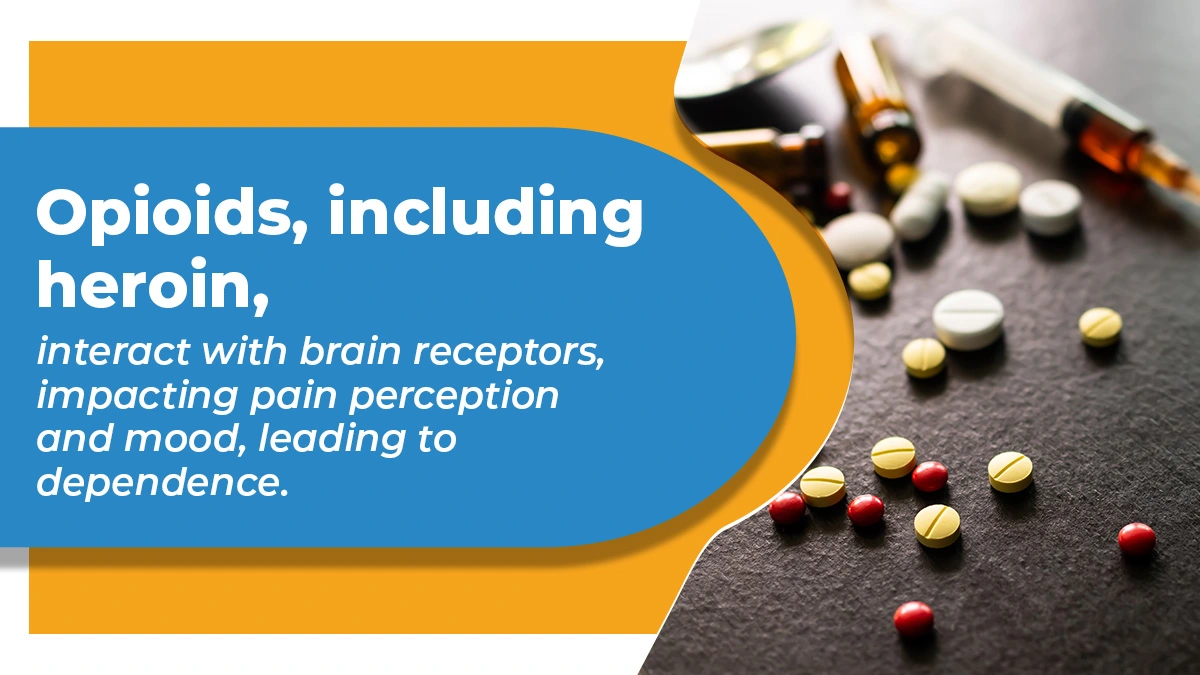Is Heroin an Opioid Drug?
Heroin is a potent opioid drug derived from morphine. It’s often used illegally for its intense euphoric effects. Because morphine is an opioid drug, heroin is also considered an opioid drug.
Heroin abuse can lead to addiction, health problems, and overdose. Addressing the heroin crisis involves education, addiction treatment, and support to reduce the harmful impact on individuals and communities.
Key Takeaways
Heroin, derived from opium poppy plants, contributes to the global opioid crisis and widespread addiction. Here’s what you need to know:
- Opioids, including heroin, interact with brain receptors, impacting pain perception and mood, leading to dependence.
- Understanding the potency differences among opioids is crucial for addressing overdose risks.
- Combating the U.S. opioid epidemic involves comprehensive strategies and accessible treatment options.
The Recovery Team is here to offer quality addiction treatment. Call us today at (800) 817-1247.
Chemical Composition of Heroin
The chemical composition of heroin includes morphine molecules with acetyl groups attached, resulting in diacetylmorphine. People misuse heroin for its euphoric effects, contributing to widespread problems.
Synthetic opioids, like fentanyl, often compound these issues. Some individuals turn to heroin after using prescription medications, such as Vicodin, which contain opioids. This transition can lead to addiction.
Heroin, typically a brown powder, is smuggled across countries, exacerbating the global opioid crisis. Addressing heroin use involves understanding its origins, educating people, and promoting safer alternatives to manage pain.
How Heroin Interacts with the Brain
Heroin affects the brain and contributes to the opioid use epidemic. Once ingested, heroin swiftly transforms into morphine, attaching to opioid receptors in the brain responsible for pain relief and euphoria. This interaction results in a surge of pleasurable sensations.
However, the risk of heroin overdoses is significant, as excessive use can depress vital functions like breathing. The opioid crisis has intensified due to the addictive nature of heroin, leading to widespread health issues. It is critical to understand how heroin works in addressing the root causes of opioid misuse.
Relationship Between Heroin and Other Opioids
Heroin and other opioids share a common origin as they both derive from the opium poppy plant. They exert their effects by crossing the blood-brain barrier rapidly, leading to a calming effect. However, heroin, a semi-synthetic opioid, is derived from morphine and has a more potent and rapid impact on the central nervous system.
The relationship lies in their addictive nature and potential for abuse, causing a widespread opioid epidemic. Black tar heroin, another form, also has distinct potency levels. Understanding these differences is crucial in addressing opioid use disorder and reducing overdose deaths.
Role of Heroin in the Opioid Epidemic
Heroin plays a huge role in the opioid epidemic. People may use it for relief from severe pain, but it often leads to opioid dependence. Heroin, like other street opioids, affects nerve cells, causing similar effects to prescription opioids.
Many opioid overdose deaths are linked to the use of heroin, sometimes disguised as counterfeit pills. As per the National Institute of Health, fatalities related to heroin overdose surged from 1,960 in 1999 to 15,482 in 2017, subsequently declining to 13,165 in 2020 and 9,173 in 2021.
The widespread use of illicit drugs like heroin fuels the opioid epidemic. It’s a leading cause of death, highlighting the dangers associated with the production of heroin in illegal labs. Efforts to address this crisis involve tackling both the supply of heroin and supporting those affected by opioid dependence.
Addressing Heroin Addiction
Heroin addiction is a serious issue. We need a combined effort involving law enforcement, healthcare, and community support to tackle it. Strategies include targeting illegal production and distribution through law enforcement while providing accessible treatment options for those affected.
Treatment Options for Heroin Dependence
Overcoming heroin dependence involves a multifaceted approach. Prescription drugs, like those alleviating withdrawal symptoms, play a crucial role. Additionally, cognitive behavioral therapy aids individuals in changing harmful behavior patterns.
Addressing the root cause is vital. As narcotic drugs often lead to heroin dependence, appropriate prescription pain relievers and alternative pain management strategies can be part of treatment plans, promoting healthier choices.
Rise Above Addiction with The Recovery Team
Opioid addiction has affected many lives, and breaking free from it is challenging but possible. The Recovery Team stands with you during these tough times and offers a secure environment during residential treatment. Our trained team of doctors during opioid addiction treatment provides medication management and various therapeutic programs to help you live a sober life.
Begin your recovery journey today. Call us at (800) 817-1247.






